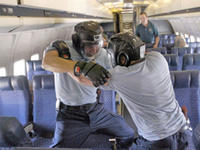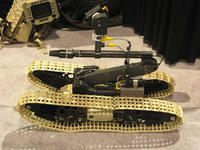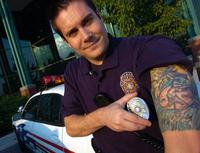-
New training facility features simulated bus, air, and rail stations

On Tuesday DHS Secretary Janet Napolitano was in Brunswick, Georgia for the grand opening of a sophisticated new $5.3 million counter-terrorism training center for law enforcement officials; the 22,000 square-foot facility features several simulation areas including a mock bus terminal, subway station, and an airport terminal
-
-
Quake disrupts East Coast cell service

Tuesday’s 5.9 magnitude earthquake that struck Virginia and could be felt across the northeast, exposed continuing weaknesses in U.S. emergency communications networks; residents in the northeast experienced difficulty making calls on their cell phones, despite no reported damage to communications infrastructure
-
-
Union Pacific settles drug fines, invests $50M in border security
Railroad giant Union Pacific Corp. agreed last week to invest $50 million to help protect the U.S.-Mexico border and to improve supply chain security; the announcement comes as the settlement of an ongoing dispute between the railroad company and U.S. border officials over nearly $500 million in fines
-
-
Detroit police to stop responding to unverified burglar alarms
As of Monday, 22 August, the Detroit police department will no longer respond to burglar alarms unless security companies can verify the need for an officer; the policy is aimed at reducing the number of false alarms and allowing officers more time to focus on critical duties; more than 98 percent of all burglar alarms are false alarms; critics of the new policy fear that it will exacerbate safety conditions in a city already plagued by crime and slow police response times
-
-
Sector Report for Tuesday, 23 August 2011: Law Enforcement Technology
This report contains the following stories.
Plus 1 additional story.
-
-
Combating tech-fueled flash mobs a new problem for police
With the help of cell phones and social networking sites, spontaneous swarms of youths have rushed into convenience stores or assaulted bystanders in a rash of “flash mobs” across the United States; law enforcement officials are struggling to find a way to effectively combat this new phenomenon which does not impede on privacy rights
-
-
New FBI app helps parents and police find missing children
The FBI has released its first mobile application aimed at helping parents locate their children when they go missing the Child ID app allows parents to electronically store photos and other vital information so that they will be able to provide law enforcement with critical details in a timely fashion if their child goes missing
-
-
"Cop shops" in Texas help fight apartment crime
Residents in Texas apartment complexes have begun dedicating entire units to police officers so they have a place to rest, take a break, and fill out reports; the cop shops help minimize crime by keeping officers in parts of town where their presence is needed
-
-
Water mist puts out fires at low pressure
A new water mist system allows for fires to be extinguished from a distance of eight meters; the system’s special nozzles generate a fine mist of tiny water droplets; the water and the propellant nitrogen are non-hazardous, environmentally friendly, and leave no residues
-
-
Antenna-equipped garments here
To make communications devices more reliable, researchers are working on incorporating radio antennas directly into clothing, using plastic film and metallic thread; the new antenna design has a range four times larger than that of a conventional antenna worn on the body — one that is used by American soldiers today
-
-
Columbine lessons helped thwart Tampa school tragedy

Police, having learnt the lessons of the 1999 Columbine High School massacre in Colorado, was in a better position to prevent violence in Tampa, Florida, last week; many school districts have threat assessment teams to try to connect the dots if there is a troubled, and potentially violent, student in their mix
-
-
Researchers developing graffiti analysis app
Law enforcement officials could soon have an app for their mobile phones that allows them to snap a picture of gang graffiti and have its meaning translated; gangs often use graffiti as a way of communicating messages like challenges or warnings to rival gangs and understanding its meaning could help fight crime
-
-
Micro Unmanned Ground Vehicle helps soldiers, first responders

Weighing just over ten pounds, Dragon Runner 10 (DR10) is small enough to carry in an assault pack and rugged enough to throw into buildings and hostile environments; the DR10 has multiple sensor and payload options, and thus is suitable for reconnaissance and surveillance missions to support small military units, patrols, and first responder teams
-
-
New tool helps visualize post-event disaster environments
Using iPad mobile devices, emergency preparedness officials and first responders participating last month in the FEMA’s National Level Exercise 2011 (NLE-11), were able, for the first time, to make use of a new, science-based software tool that allows them to view and modify accurate models of building damage and other post-event disaster effects
-
-
Phoenix police banned from sporting tattoos

In an effort to present a more professional image, an increasing number of police departments across the United States are requiring officers to cover up their tattoos; the Phoenix police department recently began requiring its officers to cover its tattoos, a move that has generated criticism due to the intense Arizona heat
-
More headlines
The long view
Why Ukraine’s AI Drones Aren’t a Breakthrough Yet
By David Kirichenko
Machine vision, a form of AI, allows drones to identify and strike targets autonomously. The drones can’t be jammed, and they don’t need continuous monitoring by operators. Despite early hopes, the technology has not yet become a game-changing feature of Ukraine’s battlefield drones. But its time will come.
